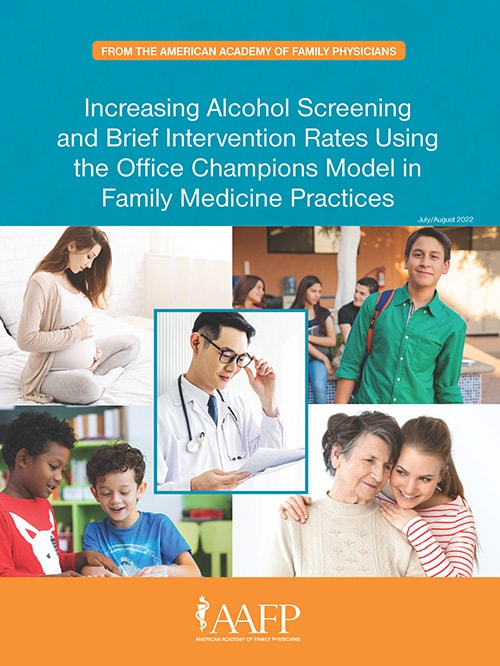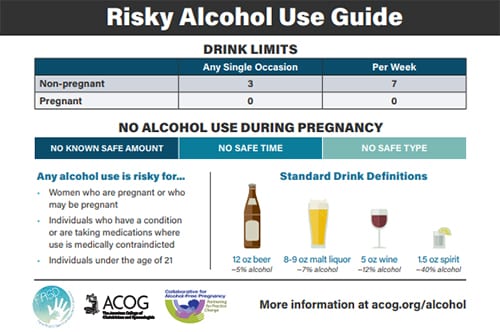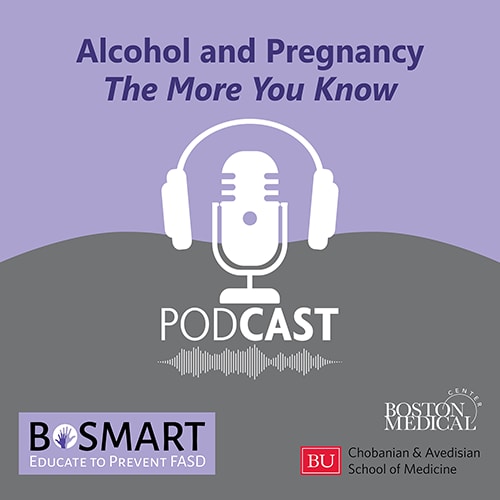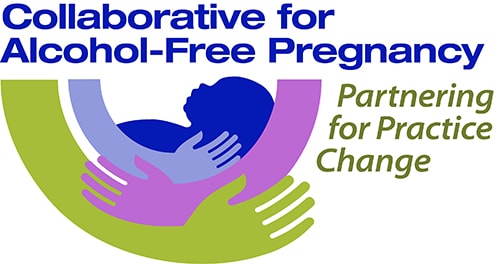Fetal Alcohol Spectrum Disorders: Resources for Prevention and Care
Fetal alcohol spectrum disorders (FASDs) are a group of conditions that can occur in a person who was exposed to alcohol before birth. FASDs have lifelong effects, including problems with behavior and learning as well as physical problems. FASDs are preventable if a developing baby is not exposed to alcohol.
CDC and its partners have resources to help prevent alcohol use during pregnancy and provide care for children with FASDs and their families.
Tools for Healthcare Providers
Family Medicine

- The American Academy of Family Physicians (AAFP) provides alcohol misuse resources to help physicians recognize and address excessive alcohol use. Resources include clinical recommendations, journal articles, video resources, and an alcohol screening and brief intervention (SBI) practice manual.
- A patient education resource, Tobacco, Alcohol, and Drugs During Pregnancy, is available in English and Spanish.
- AAFP also published two educational supplements in its journal, Family Practice Management. One supplement has tools and best practices for family physicians to incorporate alcohol SBI into practice. The other supplement highlights lessons learned from family medicine practices implementing alcohol SBI.
Medical Assisting
- The University of Nevada, Reno collaborated with the American Association of Medical Assistants (AAMA) to develop a series of Walk & Talk products, such as Things to Avoid During Pregnancy. These resources help maximize the limited time medical assistants have with patients during appointments. The brief walk from the waiting room to the exam room is an opportunity for medical assistants to provide important reminders about alcohol use.
Nursing
- The University of Alaska Anchorage collaborated with the American College of Nurse-Midwives (ACNM), Association of Women’s Health, Obstetric and Neonatal Nurses (AWHONN), and Nurse Practitioners in Women’s Health (NPWH) to develop a series of “I am a champion because…” videos. The videos feature nurses explaining why they are FASD champions and how others can get involved.
- This collaborative group, known as NPs, Midwives, and Nurses: Partnering to Prevent FASDs, also developed a modular curriculum. This resource provides support to women’s health nurse practitioner and midwifery education faculty to incorporate FASD-related content into their courses. The curriculum has seven short modules that can be used together or individually based on faculty course needs and preferences.
Obstetrics and Gynecology

- The American College of Obstetricians and Gynecologists (ACOG) developed an FASD prevention programthat provides physicians with resources and tools to communicate with patients about alcohol use during pregnancy.
- Fetal Alcohol Spectrum Disorders: Ethical and Legal Perspectivesis a free, online learning module. It helps healthcare professionals consider legal issues and ethical principles used in FASD prevention efforts. The eModule offers continuing medical education and maintenance of certification credits.
- The FASD Prevention Program also includes tools and videos to help providers address alcohol use during pregnancy and provide alcohol-related resources specific to each ACOG district or section. This includes a list of frequently asked questions providers can use to answer patient concerns.
Pediatrics
- The American Academy of Pediatrics (AAP) has developed a comprehensive, web-based FASD toolkit. The toolkit has resources for pediatricians to raise awareness, promote developmental surveillance and screening, and ensure that all children living with FASDs and their families receive appropriate and timely care. This comprehensive toolkit serves as a framework for the management of a child with an FASD in the medical home (a term that describes patient-centered, team-based health care led by a healthcare provider). The toolkit includes information on
- identification,
- diagnosis,
- referral,
- patient management resources,
- practice management tools,
- frequently asked questions for providers and families, and
- resources for in-depth training.
Social Work
- The University of Texas at Austin (UT-Austin) collaborated with the National Association of Social Workers (NASW) on a series of blogs. These blogs will help social workers understand their role in making alcohol screening and brief intervention part of routine care.
- UT-Austin authored an entry on FASDs for Oxford Bibliographies in Social Work. This is a peer-reviewed online reference designed to guide clinicians, researchers, and students through accurate and reliable resources on a given topic. The entry includes the following sections:
- General Overviews,
- History of FASD,
- Alcohol Use during Pregnancy—The Need for Proper Identification of FASD,
- Alcohol Use and Contraception,
- Prevention Approaches,
- Clinical Guides and Online Resources for FASD Prevention,
- Policy Implications, and
- FASD-Informed Services for Individuals and Families.
Training and Awareness Resources

- Two seasons of the podcast Alcohol and Pregnancy: The More You Know are available.
- Each season has three approximately 20-minute episodes exploring the many facets of FASDs.
- Featured are interviews with FASD experts and individuals with lived experience.
- Demonstrations of provider/patient conversations about prenatal alcohol exposure and FASDs are included.
- Each season offers free continuing education credits (CME, CNE) through Boston University Chobanian & Avedisian School of Medicine.
- FASD United (formerly NOFAS) has 50 frequently asked questions (FAQs) about prenatal alcohol exposure and FASDs

- CDC and the Collaborative for Alcohol-Free Pregnancy offer free online courses for healthcare professionals. The courses focus on preventing, identifying, and managing FASDs and offer free continuing education. Brief videos are available for supplemental learning as well as a database of more than 75 resources for various healthcare disciplines.
Support for Women and Families
- FASD United has a searchable resource directory. This resource can help families locate services related to diagnosis of FASDs, treatment for individuals and families living with FASDs, parent and family support groups, prevention programs, such as treatment for women, advocacy programs, and statewide services.
- FASD United offers a Family Navigator program. The family navigator provides individuals living with FASDs and their family members and caregivers with expert, confidential support and referrals.
- FASD United coordinates Circle of Hope, a network of women who have consumed alcohol during pregnancy and may have a child or children with FASDs. This network was formed to allow these women to support one another. The Circle of Hope includes a national speakers bureau and mentorship to new members who may be struggling with an alcohol use disorder (AUD) or grief. The network offers a weekly online support group, Recovering Mothers Anonymous, available for women who have used alcohol or another substance during pregnancy.
Tools to Facilitate Alcohol SBI in Clinical Settings

In 2019, CDC funded the MITRE Corporation to develop five publicly available, standards-based clinical decision support (CDS) tools that follow evidence-based guidelines for alcohol SBI. These CDS tools can be integrated into electronic health record (EHR) systems and other health information technology to
- support adoption of this preventive service,
- inform clinical decisions, and
- improve healthcare delivery.
All CDS tools are available here.
The MITRE Corporation collaborated with AllianceChicago to pilot two of the CDS tools in a real-world setting. The pilot helped to identify possible enhancements and inform future CDS implementation. The Pilot Final Report describing this work can be accessed via the following web pages:
- World Health Organization Alcohol Use Disorders Identification Test CDS
- Alcohol Brief Intervention and Referral CDS
